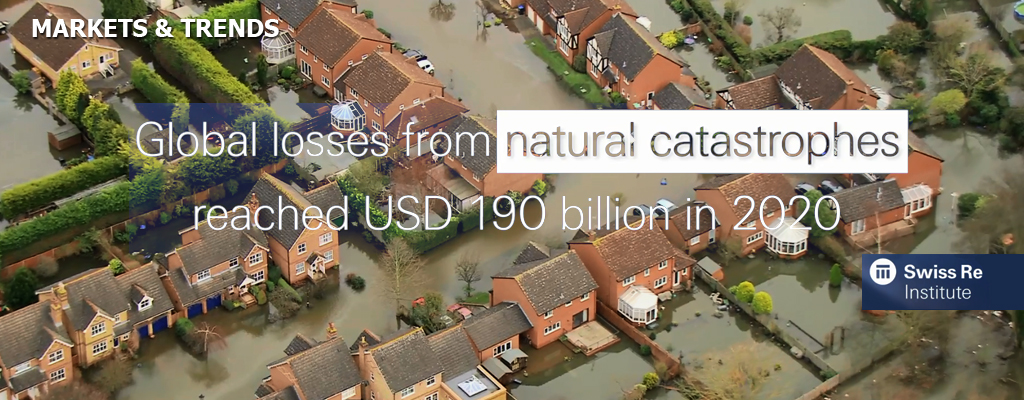Swiss Re Institute published its sigma on natural catastrophes in 2020. The sigma report underlines the severe weather events known as secondary perils, such as thunderstorms, local flooding and wildfires. These perils are increasingly and regularly responsible for the majority of natural-catastrophe-related insurance losses, driven by factors like urbanisation and climate change.
The most important aspects of Swiss Re report show:
- Global insured losses from natural catastrophes were USD 81 billion in 2020; man-made disasters resulted in USD 8 billion insured losses.
- Secondary peril events accounted for more than 70% of the natural catastrophe insured losses, resulting mostly from severe convective storms (SCS) and wildfires. In the last 10 years, SCS have contributed more than half of global insured losses from secondary perils. Given the high losses, this sigma includes a deep-dive on SCS specifically.
- North Atlantic hurricane season was a lucky escape: A record number of 30 named storms caused moderate insured losses of USD 21 billion; 12 US storms made landfall in areas of low population density and exposure - if storm occurrence patterns had been less favorable, insured losses would have been much higher.
- Recent years have seen a rise in losses from secondary perils. The same risk trends affect primary perils, suggesting that future peak loss scenarios for both hurricane season and multiple secondary peril events could be as high as USD 250-300 billion, mainly due to population growth, value accumulation in highly exposed areas and climate change effects.
Natural disaster risks are increasing and climate change will significantly exacerbate them. This underlines the urgency to better protect our communities against catastrophic losses while dramatically reducing carbon emissions. Unless mitigating measures are taken, such as greening the global economic recovery, the cost to society will increase in the future."
He added: "In many regions of the world, the need to close protection gaps persist for both primary and secondary peril exposures. Re/insurers can do more to help people, businesses and societies become more resilient."
Martin BERTOGG, Swiss Re's Head of Cat Perils also stated: "We have seen an increase in losses from secondary perils in recent years, such as severe convective storms, floods and wildfires. The same upward loss trend for primary perils and 2020 serves as another reminder of their peak loss potential. The two peril types are affected by the same loss-driving risk trends, including population growth, increasing property values in exposed regions and the effects of climate change. This suggests that with climate change, future peak loss scenarios could also increase significantly.
There were a record-breaking 30 named storms during hurricane season 2020 and a further record was set when 12 of those made landfall in the US. It cost the insurance industry USD 21 billion in claims. Yet, incredibly, we would regard that as somewhat of a lucky escape."
"Given the dynamic nature of risks, re/insurers' risk models need to increasingly consider forward-looking risk trends, such as climate change, urbanization and socio-economic inflation - rather than relying on historical data observations - when assessing the potential magnitude of losses", specified Martin BERTOGG.
1907 views


